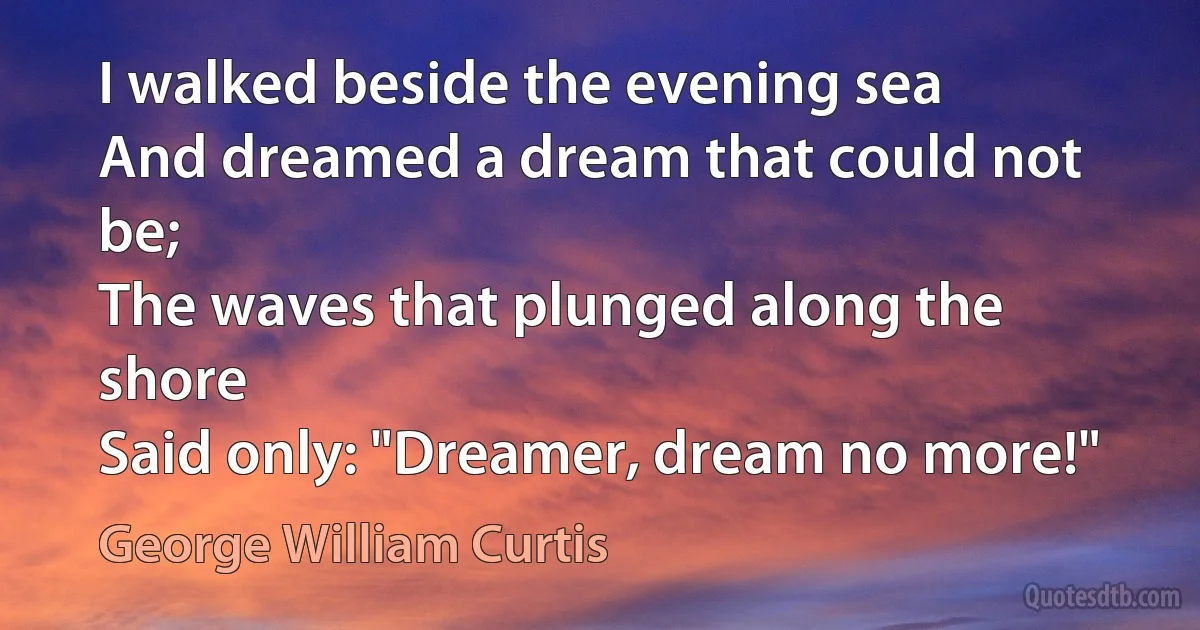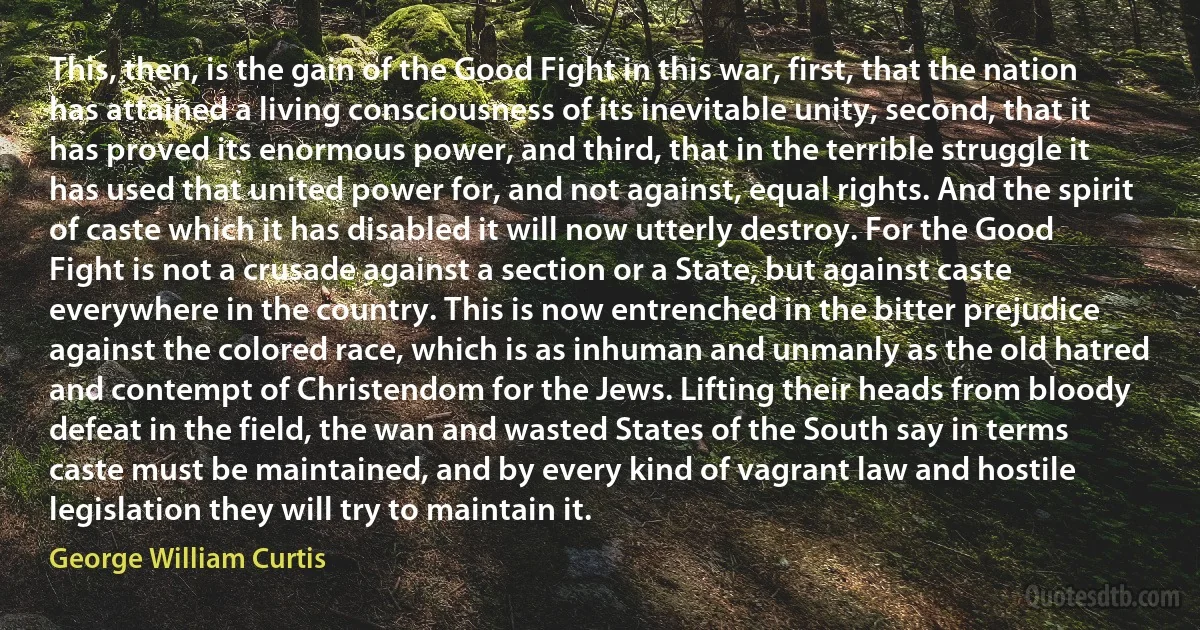George William Curtis quotes
The foreboding statesman who knew how Greece had fallen asunder and perished, who knew the mean tenure of European leagues, who knew the absolute necessity of union and the jarring jealousies of sections, saw in the Constitution but a shadowy bond which foretold early separation and disaster. It was not strange when the Union was scarcely ten years old, still in the gristle, he heard the serpent of State sovereignty angrily hissing in the Virginia and Kentucky resolutions of '98.

George William Curtis
[Human]] history is the story of that 'Good Fight', of the effort of man to attain that universal liberty to which, he feels himself born. All wars are but battles in this war. It is fought by the tongue and pen as earnestly as with the sword and shell. It is called by various names. The combatants rally under various banners. Whatever in human nature is hopeful, generous, aspiring, the love of God and trust in man, is arrayed on one side. The meaner passions, the baser purpose, stand upon the other.

George William Curtis
If there be any fact in our history beyond dispute it is that Roger Sherman expressed the universal sentiment of our fathers when he said, 'The abolition of slavery seemed to be going on in the United States, and the good sense of the several States would probably by degrees complete it'. In that spirit the compromises of the Constitution were made. Had not slavery at that time deprecated itself as an evil, the Constitution could not have been formed. Could the future have been foreseen, it would not have been formed. But, reasoning from the light they had, it was fair to believe as they believed, that, when the slave-trade was prohibited, the system would wither away under the double curse of Morality and Law.

George William Curtis
With the sure sagacity of a leader of men, Washington at once selected, for the highest and most responsible stations, the three chief Americans who represented the three forces in the nation which alone could command success in the institution of the government. Hamilton was the head, Jefferson was the heart, and John Jay was the conscience. Washington's just and serene ascendancy was the lambent flame in which these beneficent powers were fused, and nothing less than that ascendancy could have ridden the whirlwind and directed the storm that burst around him.

George William Curtis
A white man's government? Not a government of intelligence, of justice, of virtue? Not a government by the consent of the governed, but a government of complexion? Where reason is skin deep? Who is a white man? Is a Spaniard? Is a Creole? Is an octoroon? Ohio says that a blood mixture of half-and-half will do for her. But if you have a qualification for the enjoyment of equal rights which vast numbers of our population cannot by nature satisfy, it is as if you made it depend upon a man's height or the color of his hair. You ask us to prefer a system of accidents to one of principles. You ask us to agree that a worthless, idle, drunken rascal, whose face might possibly be white if it could ever be washed clean enough, may be more safely trusted with political power, than an honest, intelligent, sober, industrious colored citizen.

George William Curtis
Up to this time the argument of the abolitionists, who since 1833 had been storming the national conscience - for they knew the real citadel of a nation - with the assertion that slavery was an absolute wrong, had been met by the reply, 'Yes, yes; we know all about that. Of course it's a great wrong. The South agrees to that. It's dreadful sorry about it - but it's got the nasty thing, and it says if we'll only let it alone it will settle itself. Slavery is one of those things that work out themselves. The more you talk the worse it is. Besides, it's their own affair; we've nothing to do with it. Let 'em alone ! Let 'em alone !'.

George William Curtis
In 1850 Mr. Calhoun said, 'Let us be done with compromises. Let us go back and stand upon the Constitution'. Four years afterwards, the most Christian and most democratic statesman we have had in our history since Washington, Mr. Seward, accepted the challenge thrown out by Mr. Calhoun, solemnly saying, 'The sands of compromise are sliding from beneath my feet, and they are taking hold once more of the rock of the Constitution'.

George William Curtis
And the clergy said, 'Certainly, you're quite right; the disease is awful. Therefore, the only way is to let it alone. Amen. A contribution will now be taken up to extend Gospel privileges to the Philippine Islands'. The abolitionists retorted by declaring that you might as well let fire alone, by telling the free States that they were bound to thrust back fugitives, and were, therefore, themselves the mere bloodhounds and slaves of slavery, which could only live by expansion, and only wanted to be let alone to become impregnable.

George William Curtis
In like manner the Reverend Dr. William A. Smith, President of the Randolph-Macon College in Virginia, in his work upon the Philosophy and Practice of Slavery, deliberately repudiates Mr. Jefferson's view of slavery as a 'grossly offensive error', and attributes the anti-slavery movement to him – which is as wise as to attribute the motion of the earth to Galileo. Judge Wayne, in his late charge at Savannah upon the law against the slave-trade, confirms Mr. Stephens's statement. And, as if to establish it by the most unexpected testimony, Mr. Edward Everett, in his late discourse upon Daniel Webster, said, 'In common with all, or nearly all, the statesmen of the last generation, he believed that free labor would ultimately prevail throughout the continent'.

George William Curtis
And, on the other hand, the Greek Leonidas choking the pass against the Persian torrent, the Italian Galileo holding fast his scientific faith in the teeth of the Church of Rome, Robert Small steering his bold boat under the guns of slavery straight towards the flag of freedom, Abraham Lincoln patiently saving civil liberty, are all, in their times and countries, soldiers of the true cross, heroes and martyrs of the Good Fight.

George William Curtis
Still, slavery professes only to wish its rights. It only wants to be let alone. Of course, what else could it want? And what else is the secret of the present state of the country? Under the plea of being let alone - that it was a dreadful thing and only wanted to mind its own business - it has quietly possessed itself, one after another, of all the outworks of the Constitution, and now seeks to intrench itself finally in the citadel.

George William Curtis
Never fear, true hearts! A people which has shown the quality of its genius as this nation has in the last four years will finish its work. It will go forward and not backward. For our America shall be the Sinai of the nations, and from the terrible thunders and lightnings of its great struggle shall proceed the divine law of liberty that shall subdue and harmonize the world.

George William Curtis
Carolina or Virginia may try to break away. In the effort it may destroy its local government as it has now destroyed it, except by successful revolution no rebellious state can escape the jurisdiction, and it will be reorganized exclusively by the national authority of the United States of America. This is what Gettysburg roars and Vicksburg and Port Royal. This is the thunder of the Kearsarge as she sinks the Alabama, This is the song of Sherman's march to the sea; and Lee's surrender, the fall of Richmond, and the universal crash of the rebellion mutter and murmur their reluctant 'Amen, Amen'. But, at the same moment that the profound sense of nationality and the power of the nation are revealed, the national mind has gained a clear perception of the relation of morals and politics, the strict dependence of civil order and national prosperity upon morality.

George William Curtis
Therefore our Constitution will always be the measure of our national morality; and if we were all sorry, it would still be true. I am not sorry, for it founds the government in the character of the people, and hence everything in the future depends upon the popular faith in the original principles of the government. If the people of this country do believe with the fathers that there are self-evident, original, and indefeasible human rights, then slavery will surely, quietly, and legally be terminated, under the Constitution of the United States. If they do not believe that there are such rights, then slavery will, just as surely, quietly, and legally, be established under the Constitution, which, as the paramount law of the land, will legalize it in New York as well as in Alabama, leaving the policy of adopting it to be decided by individual judgment.

George William Curtis



